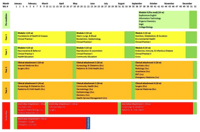
Photo from wikipedia
Purpose To inform research on developing or adopting leadership competency frameworks for use in U.S. undergraduate medical education (UME), this scoping review describes the content of U.S. UME leadership curricula,… Click to show full abstract
Purpose To inform research on developing or adopting leadership competency frameworks for use in U.S. undergraduate medical education (UME), this scoping review describes the content of U.S. UME leadership curricula, associated competency frameworks, and content delivery. Method The authors searched PubMed, Embase, and ERIC databases on June 22, 2020. They included English-language studies that described U.S. UME curricula in which the primary end goal was leadership development. They excluded studies published before January 1, 2000. Data were extracted on leadership competency frameworks and curricular content, audience, duration, electivity, selectivity, learning pedagogies, and outcome measures. The curricular content was coded and categorized within the Medical Leadership Competency Framework (MLCF) using the constant comparative method. A repeated search of the literature on May 14, 2021, did not yield any additional studies. Results Of 1,094 unique studies, 25 studies reporting on 25 curricula met inclusion criteria. The course content of the curricula was organized into 91 distinct themes, most of which could be organized into the first 2 competencies of the MLCF: Demonstrating Personal Qualities and Working With Others. Thirteen curricula (52%) aligned with leadership competency frameworks, and 12 (48%) did not appear to use a framework. Number of participants and target learner level varied widely, as did curricula duration, with fewer than half (n = 12, 48%) spanning more than 1 semester. Most curricula (n = 14, 56%) were elective, and many (n = 16, 64%) offered experiential learning. Most studies (n = 16, 64%) reported outcomes as student perception data. Conclusions The authors found wide variation in content of U.S. UME leadership development curricula, and few curricula aligned with an established leadership competency framework. The lack of professional consensus on the scope of medical leadership and how it should be taught thwarts effective incorporation of medical leadership training within UME.
Journal Title: Academic Medicine
Year Published: 2022
Link to full text (if available)
Share on Social Media: Sign Up to like & get
recommendations!